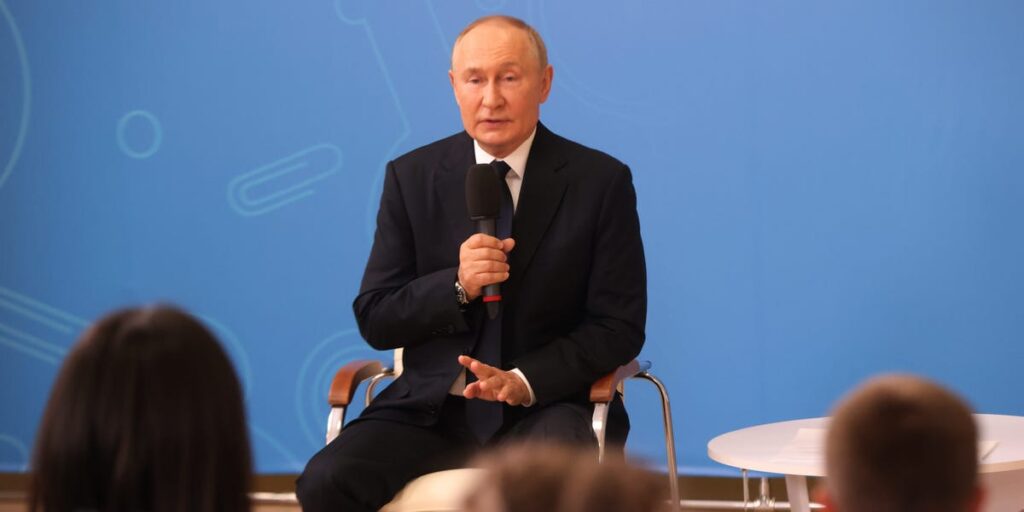A new Russian pilot program with 100 preschools aims to teach children as young as three to be “worthy citizens” and “cultivate respect for the culture and history of Russia,” the country’s education ministry said.
The lesson series, called “Conversations about Important Things,” is to be tested in schools for children from three to seven in the occupied Donetsk, Luhansk, and Zaporizhzhia regions, Moscow, Kaliningrad, and at least 17 other Russian oblasts and autonomous regions.
On Tuesday, Russia’s education minister, Sergey Kravtsov, said the classes would be tailored to young children with “colorful illustrations, interactive tasks, and game elements.”
“This will help children better absorb information, form correct ideas about important life values, and ultimately grow up to be worthy citizens of their country,” Kravtsov said.
While the education ministry said the program involves lessons on citizenship, morality, and families, it is also meant to foster a “love for the motherland.”
“Conversations about Important Things,” which promotes Russia’s national identity and past war actions, has been compulsory learning in high schools since 2022, the year that Moscow invaded Ukraine.
The new push into preschools comes after Russian President Vladimir Putin said in October that he supported the program being rolled out to the country’s “youngest children.”
Putin said he was disappointed, for example, that the Soviet Union’s heavy losses in the Battle of Stalingrad were not discussed in children’s textbooks about World War II.
“All this shows that, of course, at the very earliest age we must instill certain basic things in a child,” he said at a meeting with Russian teachers that month. “But everything, I repeat, must be within the bounds of reason.”
War-themed lessons for preschoolers
The education ministry didn’t specify what activities would be included in the pilot lessons. However, social media posts from some Russian preschools and kindergartens indicate that they’ve already voluntarily introduced some form of these programs.
Novaya Gazeta Europe, an independent news organization founded by exiled Russian journalists, wrote in October that over 560 Russian preschools and kindergartens had posted about introducing “Conversations for Important Things” to their students.
The outlet analyzed social media posts from over 10,000 kindergartens about war-themed lessons. It found that at least 19,000 of these activities were about supporting the Russian invasion of Ukraine.
In other posts seen by Business Insider on the Russian social network VKontakte, preschools and kindergartens uploaded photos of children video-calling a Russian soldier purportedly fighting in Ukraine and of students lining up in formation to honor the Russian flag.
For example, one kindergarten in the Orenburg region said in October that it held a version of “Conversations about Important Things” to discuss the local farming industry. It posted a photo of young children holding up the region’s coat of arms.
Another preschool, in Kursk, said it invited a former helicopter pilot who fought in Afghanistan to speak to students. The post said he “read poems of his own composition about the exploits of the heroes of the Great Patriotic War and participants in a special military operation.”
In January, the city of Vologda also said in a statement that all of its kindergartens were planning patriotic and war-themed classes for “Conversations about Important Things.”
“Children will be told about the heroes of the Great Patriotic War, military professions, hero cities, monuments, awards for military exploits, and much more,” the statement said, referring to World War II.
One analysis by the independent Russian media outlet Agency found that the classes in Vologda discussed military awards, taught kids how to be bandaged, and included games about armored vehicles.
All of this comes as Russia goes all out to shore up local support for the war in Ukraine. Moscow has also sought to assimilate the population of occupied Ukrainian territories, offering parents cash sums to send their children to Russian-controlled schools.
Public favor is especially key for the Kremlin, which relies on costly infantry assaults to fight against Ukraine — a tactic requiring a steady flow of fresh recruits from the civilian population.
Ukrainian intelligence says that Russia has repeatedly hit its recruitment targets through hefty sign-up bonuses and payments made to families of wounded or killed soldiers. This year, Russia reportedly plans to recruit 343,000 new troops.
Read the full article here


